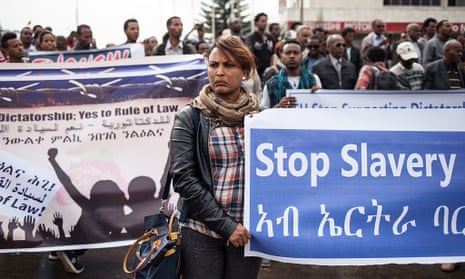Eritreans in exile have launched legal proceedings against the EU, accusing it of financing a scheme in Eritrea that uses “forced labour”.
The Netherlands-based Foundation Human Rights for Eritreans (FHRE) has called on the EU to immediately stop a €20m (£17m) road construction project, which it says violates human rights law as well as the EU’s own charter, since it uses national service recruits.
Eritrea’s system of compulsory national service can last for 20 years or more, and has been likened by both the UN and the European Parliament to mass enslavement. Conscripts often work 72-hour weeks in extremely harsh conditions with inadequate food and low pay. It is the major cause of mass migration from Eritrea, which has been called the world’s “fastest emptying country”.
The road rehabilitation scheme, which launched in February and will help connect Eritrea’s ports to the border with neighbouring Ethiopia, is financed by the EU’s new Emergency Trust Fund for Africa and was described by an EU spokesman as indicative of “a new approach to engaging with Eritrea, which has the improvement of the lives and rights of Eritreans at its core”.
It is part of a package of support to Eritrea and the Horn of Africa designed to stem the flow of migrants to Europe.
It is also a measure of Eritrea’s gradual emergence from international isolation in recent years, which has seen it grow closer to Gulf states such as Saudi Arabia and the United Arab Emirates in particular.
This culminated last year in a peace deal with longtime foe Ethiopia and the lifting of UN sanctions, which had first been imposed in 2009.
Many Eritreans had hoped that the end of the country’s 20-year cold war with Ethiopia would prompt a broader political opening inside Eritrea, including ending indefinite national conscription. On 16 March, the UN deputy high commissioner for human rights, Kate Gilmore, called on the Eritrean government to do so.
But since the peace agreement “nothing has changed whatsoever with regard to the national service”, said Gaim Kibreab, an Eritrean academic and author of the first study on the impact of Eritrean national service.
The government has made no public announcements about a timeline for reform, such as reducing the length of national service to its original 18-month limit.
According to Zecarias Gerrima, an Eritrean journalist who has lived in exile in Uganda since 2014, some conscripts were told earlier this year there would be no change in the terms of national service for at least another four years.
The EU has a history of supporting road construction in Eritrea. However, according to Klara Smits, of the Brussels-based group Europe External Policy Advisors, it has been careful to avoid the use of forced labour in the past. In 2015 the EU approved a €200m aid package for Eritrea but the funds were not disbursed due to disagreements over choice of projects.
“It is likely that projects in the past have used forced labour, but this is hard to check due to lack of ability of the EU to monitor. It is certainly the first time the EU, as far as we can tell, has openly admitted to using national service labour in a project,” Smits told the Guardian.
According to the official EU project document the labour involved will be made up of national service recruits, alongside permanent government employees as well as “those mobilised from the local community on a cash-for-work basis”. Construction companies involved in the scheme are owned by the ruling party.
The report also states that reforms to national service are expected to begin “incrementally” only once new jobs have been created. The issue of higher pay for conscripts will be the subject of a “heightened dialogue” between the EU and the Eritrean government.
“The EU does not support indefinite national service in Eritrea,” the EU spokesman told the Guardian.
“The EU will not pay for labour under this project. The EU’s contribution only covers the provision of emergency procurement of equipment and materials. The project will be carefully monitored, making sure that all people employed are adequately remunerated and work under appropriate conditions. At the same time, political dialogue will increase to encourage the government to reform the national service.”
This is the second time legal action has been taken against a western organisation accused of using forced labour in Eritrea. An earlier case, launched by Eritrean refugees suing Canadian mining company Nevsun Resources for alleged use of forced labour at its gold mine in Eritrea, was taken to Canada’s supreme court in January.
Eritrean government spokesman Yemane Gebremeskel did not respond to requests for comment on the new case.
Mehretab Medhanie, a ruling party official, tweeted on Monday that limiting national service to 18 months “isn’t debatable” but that “equally, Eritrea should never abandon it”.
The FHRE’s letter of summons gives the EU two weeks to respond to its claims. Further legal steps will be taken if the EU does not reply or refuses to cease funding the scheme.
“It’s a very strange change of policy,” said Emiel Jurjens, a Dutch human rights lawyer representing FHRE. “It is a major shift in [the EU’s] approach to Eritrea.”
